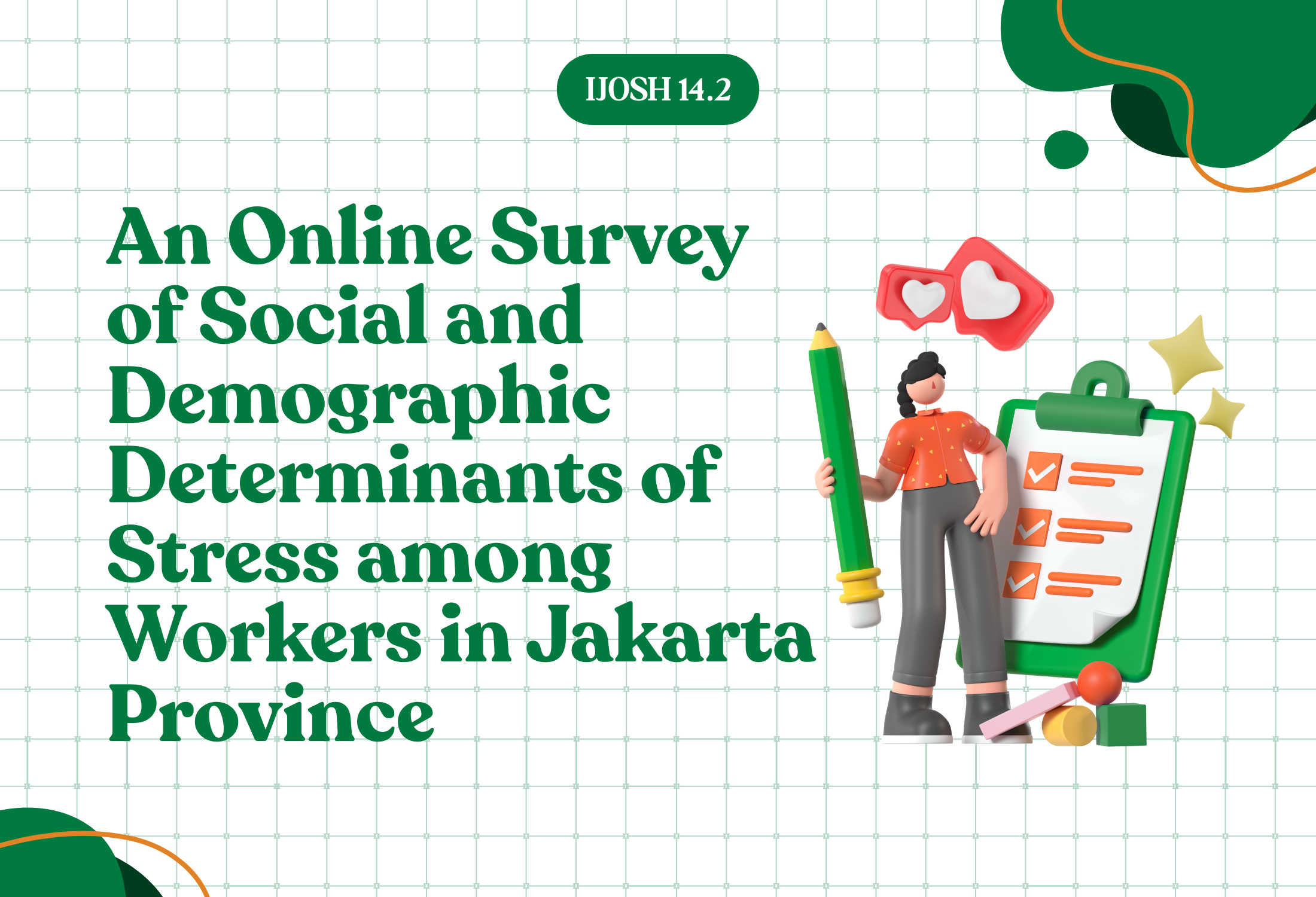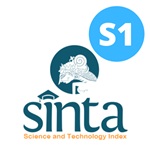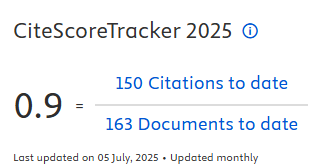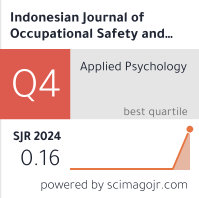An Online Survey of Social and Demographic Determinants of Stress among Workers in Jakarta Province

Downloads
Introduction: Stress is related to the individual's psychological, physiological, and behavioral response to stressors. Many social and demographic determinants are probable causative factors of stress through a complex path. In Jakarta Province, a significant number of workers commute from surrounding cities, potentially exacerbating stress due to long travel times, job demands, and other related factors. This study aimed to determine social and demographic factors contributing to stress among workers in Jakarta Province. Methods: A cross-sectional online survey was conducted between October and December 2023 among 200 workers aged 15–65 years. Data were collected using a self-administered questionnaire via Google Form, distributed through snowball sampling on social media. The survey included the Perceived Stress Scale (PSS-10), Multidimensional Scale of Perceived Social Support (MSPSS), Social Capital Scale, UCLA Loneliness Scale, and Social Network Index (SNI). A backward stepwise linear regression was performed to identify significant predictors of stress. Results: This study found that the mean stress score among workers was 19.39, which indicated a moderate stress level. The model showed social support (ß=-0.13), social capital (ß=-0.90), age (ß=-0.07), income (ß=0.00), distance (ß=0.19) as predictors of stress among workers and also obtained an R-Square value 50.4%. Conclusion: Social support, social capital, age, income, and commuting distance significantly influence workers' stress levels in Jakarta Province. Enhancing workplace social support systems and promoting stronger social networks may help mitigate stress. Employers and policymakers should consider interventions such as flexible work arrangements and peer support programs to improve employee well-being
Acoba, E. F. (2024) ‘Social Support and Mental Health: the Mediating Role of Perceived Stress’, Frontiers in Psychology, 15(February), pp. 1–12. doi: 10.3389/fpsyg.2024.1330720
American Psychological Association (2021) The American workforce faces compounding pressure.
Aras, R. A., Wahyuni, S. and Thalib, A. H. S. (2022) ‘ Contribution of Social Support to Work-life Balance on Working Women During Work From Home’, Proceedings of the Interdisciplinary Conference of Psychology, Health, and Social Science (ICPHS 2021), 639(Icphs 2021), pp. 24–30. doi: 10.2991/assehr.k.220203.005
Arikan, G. (2021) ‘Stress in COVID-19 Pandemic: Negative and Positive Outcomes, and the Possible Role of Preventive Interventions’, Psikiyatride Güncel Yaklaşımlar, 13(1), pp. 135–145. doi: 10.18863/pgy.752541
Central Bureau of Statistics of Jakarta Province (2022) Jumlah Penduduk Menurut Kabupaten/Kota di Provinsi DKI Jakarta (Jiwa), 2020-2022, BPS DKI JAKARTA.
Chatterjee, K. et al. (2020) ‘Commuting and Wellbeing: A Critical Overview of the Literature with Implications for Policy and Future Research’, Transport Reviews, 40(1), pp. 5–34. doi: 10.1080/01441647.2019.1649317
Chu, B. et al. (2023) Physiology, Stress Reaction, StatPearls Publishing.
Elliason, E. K. (2021) ‘Influence of Occupational Stress and Social Relationship at the Workplace on the Psychological Wellbeing of Nurses and Midwives in the Catholic Health Service of the Western Region of Ghana’, Journal of Biomedical Research & Environmental Sciences, 2(12), pp. 1291–1295. doi: 10.37871/jbres1384
Erlangga, D. et al. (2019) ‘The Impact of Public Health Insurance on Health Care Utilisation, Financial Protection and Health Status in Low- and Middle-Income Countries: A Systematic Review.’, PloS One, 14(11), p. e0225237. doi: 10.1371/journal.pone.0225237
Foy, T. et al. (2019) ‘Managing Job Performance, Social Support and Work-life Conflict to Reduce Workplace Stress’, International Journal of Productivity and Performance Management, 68(6), pp. 1018–1041. doi: 10.1108/IJPPM-03-2017-0061
French, S. A. et al. (2019) ‘Nutrition Quality of Food Purchases Varies by Household Income: The SHoPPER Study’, BMC Public Health, 19(1), pp. 1–7. doi: 10.1186/s12889-019-6546-2
Garrido-Cumbrera, M. et al. (2023) ‘Can the Mode, Time, and Expense of Commuting to Work Affect Our Mental Health?’, Transportation Research Interdisciplinary Perspectives, 21, p. 100850. doi: 10.1016/j.trip.2023.100850
Gruebner, O. et al. (2017) ‘Cities and mental health’, Deutsches Arzteblatt International, 114(8), pp. 121–127. doi: 10.3238/arztebl.2017.0121
Hall, K. and Sloan, E. (2021) Regulating Emotions in Young Adulthood.
Hellerstein, J. K. and Neumark, D. (2020) ‘Social Capital, Networks, and Economic Wellbeing’, Future of Children, 30(1), pp. 127–152. doi: 10.1353/foc.2020.0002
Hsu, H. C. (2019) ‘Age Differences in Work Stress, Exhaustion, Well-being, and Related Factors from an Ecological Perspective’, International Journal of Environmental Research and Public Health, 16(1). doi: 10.3390/ijerph16010050
Karakaş, A. and Tezcan, N. (2019) ‘The Relation Between Work Stress, Work-Family Life Conflict and Worker Performance: A Research Study on Hospitality Employees’, European Journal of Tourism Research, 21, pp. 102–118. doi: 10.54055/ejtr.v21i.361
Lestari, R. (2021) Seminar Nasional Kesehatan Masyarakat IV, (November), pp. 80–84.
Li, L. et al. (2023) ‘Employment Disruption and Wellbeing Among Young Adults: A Cross-National Study of Perceived Impact of the COVID-19 Lockdown’, Journal of Happiness Studies, 24(3), pp. 991–1012. doi: 10.1007/s10902-023-00629-3
Li, R. et al. (2023) ‘The Influence of Perceived Stress and Income on Mental Health in China and Germany’, Heliyon, 9(6), p. e17344. doi: 10.1016/j.heliyon.2023.e17344
Li, Z. et al. (2021) ‘The effects of psychological capital, social capital, and human capital on hotel employees’ occupational stress and turnover intention’, International Journal of Hospitality Management, 98, p. 103046. doi: 10.1016/j.ijhm.2021.103046
Liu, Q. et al. (2021) ‘Social Support, Resilience, and Self-esteem Protect Against Common Mental Health Problems in Early Adolescence’, Medicine, 100(4), p. e24334. doi: 10.1097/MD.0000000000024334
Liu, X. et al. (2023) ‘The trip from home to work: exploring how commuting stress impacts on tourism and hospitality employees’ work engagement’, Current Issues in Tourism, pp. 1–14. doi: 10.1080/13683500.2023.2272019
Mabindisa, T. J. and Legoabe, R. (2021) ‘Factors Contributing To Low Employee Morale at a South African State Owned Entity in Financial Distress’, African Journal of Education & Transformation (AJET), 1(2).
Mawarni, T. and Jaiz, R. (2020) ‘Gambaran Tingkat Stres dan Mekanisme Koping Perawat setelah Ketidakberhasilan Tindakan RJP di Ruang ICU RSUD Dr. H. Moch. Ansari Saleh Banjarmasin’, Journal Nursing Army, 1(2), pp. 16–24.
St. Myers, W. M. (2021) ‘Complex Trauma and Post-traumatic Growth: An Autoethnography on Relational Post-traumatic Growth using Experiential Personal Construct Psychology’, Dissertation. Pittsburgh: Psychology Faculty of Point Park University.
Nainggolan, A. (2019) ‘Gambaran Tingkat Stress Perawat Yang Bekerja Diruang IGD RSUD dr Pirngadi Kota Medan Tahun 2019’, Poltekkes Kemenkes Medan, 1(1).
Norgate, S. H. et al. (2020) ‘The Impact of Public Transport on the Health of Work Commuters: A Systematic Review’, Health Psychology Review, 14(2), pp. 325–344. doi: 10.1080/17437199.2019.1618723
Oinas, T. et al. (2020) ‘The Effect of Early Career Social Capital on Long-term Income Development in Finland’, International Journal of Sociology and Social Policy, 40(11/12), pp. 1373–1390. doi: 10.1108/IJSSP-02-2020-0032
Oktaviana, D. A. and Wardani, I. Y. (2023) ‘Dukungan Sosial Berhubungan Dengan Tingkat Stres Pekerja Pada Masa Quarter Life Crisis’, Jurnal Persatuan Perawat Nasional Indonesia (JPPNI), 7(2), p. 62. doi: 10.32419/jppni.v7i2.367
Punu, A. and Wijono, S. (2022) ‘Work-Family Conflict With Work Stress Married Female Lecturer At Satya Wacana Christian University’, Journal of Social Research, 1(12), pp. 771–787. doi: 10.55324/josr.v1i12.400
Riskesdas (2018) Laporan Provinsi DKI Jakarta: Riskesdas 2018, Kementerian Kesehatan RI.
Shen, P. and Slater, P. (2021) ‘Occupational Stress, Coping Strategies, Health, and Well-Being Among University Academic Staff—An Integrative Review’, International Education Studies, 14(12), p. 99. doi: 10.5539/ies.v14n12p99
Tamminga, S. J. et al. (2023) ‘Individual-level Interventions for Reducing Occupational Stress in Healthcare Workers.’, The Cochrane Database of Systematic Reviews. 5(5), p. CD002892. doi: 10.1002/14651858.CD002892.pub6
Trisnasari, S. A. and Wicaksono, D. A. (2021) ‘Pengaruh Loneliness terhadap Job Stress Pekerja Work from Home (WFH) pada Masa Pandemi Covid-19’, Buletin Riset Psikologi dan Kesehatan Mental (BRPKM), 1(2), pp. 1218–1226. doi: 10.20473/brpkm.v1i2.28444
Weerasinghe, T. D., Karunarathna, D. I. M. and Subashini, B. L. C. (2021) ‘Effect of Road Traffic Congestion on Stress at Work: Evidence from the Employees Working in Metropolitan Areas of Colombo, Sri Lanka’, Proceedings of the International Conference on Business & Information (ICBI). doi: 10.2139/ssrn.3853900
WHO (2020) Occupational health: Stress at the workplace, World Health Organization.
Wojciechowska, M. (2021) ‘Trust as a Factor in Building Cognitive Social Capital among Library Workers and users: Implications for Library Managers’, Journal of Academic Librarianship (JAI), 47(1), p. 102300. doi: 10.1016/j.acalib.2020.102300
Woje, B., Isa, R.B. and Bello, A.O. (2023). 'Impact of Stress on Employee's Performance in the Construction Industry: Systematic Literature Review and Bibliometric Analysis', Proceedings of International Science and Art Research. 27-28 May, 2023 Edirne, Turkey. pp 478-489.
Wu, J.-J. et al. (2023) ‘Impact of Social Support and Reciprocity on Consumer Well-Being in Virtual Medical Communities’, INQUIRY: The Journal of Health Care Organization, Provision, and Financing, 60, p. 004695802311552. doi: 10.1177/00469580231155290
Zhang, S. and Xiang, W. (2019) ‘Income Gradient in Health-related Quality of Life - The Role of Social Networking Time’, International Journal for Equity in Health, 18(1), pp. 1–10. doi: 10.1186/s12939-019-0942-1
Zhou, H. and Zheng, Q. (2022) ‘Work Stressors and Occupational Health of Young Employees: The Moderating Role of Work Adaptability’, Frontiers in Psychology, 13. doi: 10.3389/fpsyg.2022.796710

This work is licensed under a Creative Commons Attribution-NonCommercial-ShareAlike 4.0 International License.

In order to be accepted and published by The Indonesian Journal of Occupational Safety and Health, Author(s) who submit an article should complete all the review process. The copyright of received articles assigned to the The Indonesian Journal of Occupational Safety and Health and Department of Safety and Health, Universitas Airlangga as publishers of the journal. The intended copyright includes the rights to publish articles in various forms (including reprints).
The Editorial Team of The Indonesian Journal Of Occupational Safety and Health and Department of Safety and Health strive to ensure that no errors occur in the articles that have been published, both data errors and statements in the article.
Users of this website will be licensed to use materials from this website following the Creative Commons Attribution-NonCommercial-ShareAlike 4.0 International License. No fees charged. Please use the materials accordingly.
------------------------------------------------------------------------------------------------------------------------------------------------------------------------------------------
Attribution ” You must give appropriate credit, provide a link to the license, and indicate if changes were made. You may do so in any reasonable manner, but not in any way that suggests the licensor endorses you or your use.
NonCommercial ” You may not use the material for commercial purposes.
ShareAlike ” If you remix, transform, or build upon the material, you must distribute your contributions under the same license as the original.







 How to Submit Articles in OJS
How to Submit Articles in OJS

























